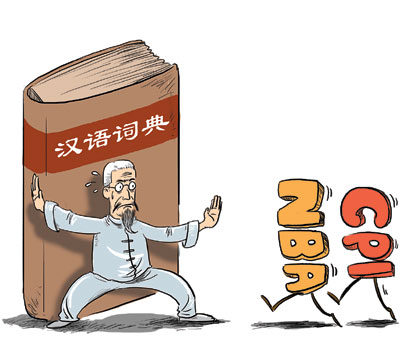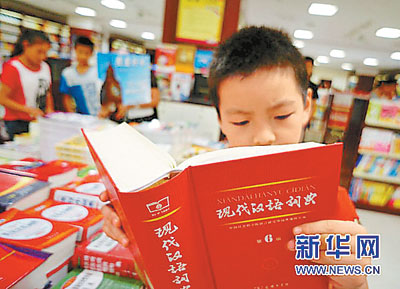|

Anne Zhang
zhangy49@fmail.com
MORE than 100 Chinese scholars signed a petition last week protesting the inclusion of English words and abbreviations in the newly revised Modern Chinese Dictionary.
The petitioners, including linguistics experts, senior reporters and translators, said the inclusion of 239 English abbreviations, such as NBA (National Basketball Association) and WTO (World Trade Organization), violates the country’s regulations regarding Chinese language usage, including the Law on the Standard Spoken and Written Chinese Language.
The 239 English abbreviations take up 15 pages in the sixth edition of the Modern Chinese Dictionary, the most authoritative Chinese-language dictionary published by the Commercial Press this year. The dictionary began including English phrases in 1996, defining 39 such terms in an appendix.

Li Minsheng, a scholar with the Chinese Academy of Social Sciences and one of the petitioners, said it’s unreasonable to add English words to the primary body of the dictionary because the dictionary is an authoritative reference book that teaches people how to use Chinese in standard ways.
“The inclusion of such a great amount of English words in the Modern Chinese Dictionary symbolizes the invasion of the imperialistic culture, which threatens the purity of Chinese language and culture,” Li told Chinese-language media last week.
Alarmist talk
But the Chinese language has never been entirely pure, with English or without. The words “dang” (“political party”), “jieji” (“class” as in social strata) and “douzheng” (“struggle”) are borrowed from Japanese, while “dejia” (the German Bundesliga) and “yingchao” (the English Premier League) are from Western languages.
Tan Yifan, a Shenzhen Daily editor who has a master’s degree in linguistics, said foreign words and abbreviations used in the Chinese language are called “loanwords” by academics.
“Loanwords can be commonly found in the world’s major languages because language is always developing and absorbing new elements,” she said. She added that Chinese people should be more tolerant toward these loanwords.

Wang Yimin with Xiamen University Press said it’s alarmist to say the inclusion of English words threatens Chinese culture. He said analysis of those words should be made on a case-by-case basis.
“A majority of English words included in the Modern Chinese Dictionary are nouns, which won’t affect the Chinese language too much,” he said. “But non-nouns that have Chinese equivalents shouldn’t be included in the dictionary.”
For example, “PK” or “player-killing,” a term derived from video games that indicates competitiveness, can be translated as “duijue” or “bipin.” Although “PK” has been incorporated into the dictionary, it’s doubtable that the word will soon have significant usage, Wang said.
Debates over the use of foreign words in the Chinese language were first sparked after some Chinese media, including China Central Television, banned the use of certain English abbreviations in their programing two years ago.
The most well-known outcome of the linguistic ban was the replacement of “NBA” with “meizhilan,” the Chinese equivalent of “National Basketball Association of the United States.”
Chinese people are divided when it comes to the inclusion of English words and abbreviations in their dictionaries. Some advocate for a purified language by using official Chinese translations of English terms, while others argue that some translations can impede communication.
Li, with the Chinese Academy of Social Sciences, said the Chinese language should absorb foreign words to keep up with the world’s development. But he also said Chinese people should use translated Chinese words to keep the language’s identity and purity.
“Since words like ‘Nuojiya’ and ‘Motuoluola’ are well accepted and commonly used in our language instead of ‘Nokia’ and ‘Motorola,’ why don’t we translate ‘iPhone’ or ‘iPad’ into Chinese before we use them?” Li grumbled.
Many netizens don’t agree with Li. They said many English words and abbreviations are widely used in China for the sake of simplicity because their Chinese equivalents are often lengthy and obscure.
“Should I say ‘dianzijisuanji duancengsaomiao’ (“computerized tomography”) instead of CT when I need such a procedure?” mocked a netizen named Fulaidechaoren.
Cultural gaps
Some foreigners think using more romanized letters in the Chinese language would promote international communication.
“China has already been using hanyu pinyin for several decades, and it has greatly benefited the nation and society and has also helped bridge the linguistic and cultural gaps between the Chinese language and Western languages,” said Professor Robert S. Bauer, an expert in linguistics.
Richard Sears, known as “Hanzi Uncle,” has studied Chinese etymology for more than 20 years and told Shenzhen Daily that it’s natural to include English words in the Chinese language if they are in common use in the country. But he added that he wants to preserve the understanding of Chinese characters through efforts including his Chinese etymology Web site.
Tan said some English words and abbreviations could be assimilated by the Chinese language gradually, so it could be wise to comply with the development of a language rather than forcibly excluding loaned words from daily usage.
Meeting readers’ needs
An Aug. 29 conference, held by the Institute of Linguistics of the Chinese Academy of Social Sciences and The Commercial Press, addressed the dictionary debate. Editors and experts who contributed to the revisions explained that the purpose of including English abbreviations was to help readers learn those words and the knowledge behind them.
“As Chinese people get more contact with overseas (people and cultures), abbreviations are gradually becoming a part of their daily communication,” said Su Peicheng, a professor with the Chinese Department of Peking University. “As a reference book, the dictionary’s biggest concern is to solve the language problems of readers.”
Conference participants added that the need to standardize new loanwords is very urgent, as more of them are appearing in regular Chinese use.
|

